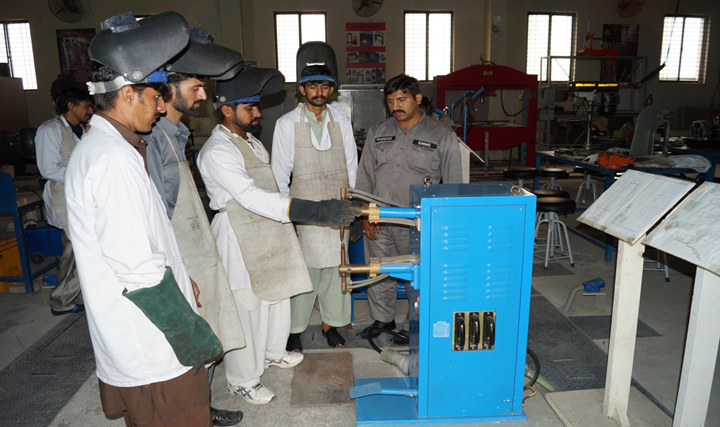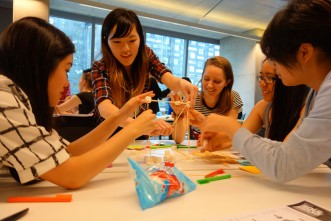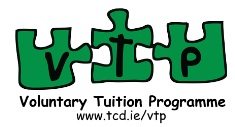2015 MacJannet Prize Winners
First place winner, receiving $7,500
NCSC Education for Empowerment, National University of Sciences and Technology (Pakistan)
The NCSC Education for Empowerment program was established in 2007 at the National University of Sciences and Technology. The program focuses on  community education needs and empowering the community by providing basic education, career counseling for better employability, collecting and distributing textbooks, improving existing education quality and imparting skills for employment and poverty reduction, as well as contributing to educational infrastructure improvement.
community education needs and empowering the community by providing basic education, career counseling for better employability, collecting and distributing textbooks, improving existing education quality and imparting skills for employment and poverty reduction, as well as contributing to educational infrastructure improvement.
There are approximately 6,000 students who participate in the Education for Empowerment program, either by taking a module class or by joining the program as a volunteer. There is a faculty advisor who coordinates annual budget, transportation, supplies, space, security and provides administrative support. The university students design and implement all of the community projects with the support and guidance of faculty and local NGOs. When students start newprojects, they are required to train a new cohort of students to carry on the program once they graduate. There is a wide-range of programs and services provided by the Education for Empowerment program, including tutoring, parent counseling, career counseling, skill development workshops, and vocational training. Learn more.
Second place winner, receiving $5,000
UTS Shopfront Community Program, University of Technology Sydney (Australia)
 The UTS Shopfront Community Program was established at the University of Technology, Sydney in 1996 by academics who saw the need for a program around engaged learning, advocacy and social justice that would enable community access to the university. The main program is curricular, with the Shopfront facilitating projects and internships available to final year undergraduate and postgraduate students across all disciplines. The students use their ‘work ready’ skills to support community organisations with capacity-building projects that their budgets would not normally accommodate.
The UTS Shopfront Community Program was established at the University of Technology, Sydney in 1996 by academics who saw the need for a program around engaged learning, advocacy and social justice that would enable community access to the university. The main program is curricular, with the Shopfront facilitating projects and internships available to final year undergraduate and postgraduate students across all disciplines. The students use their ‘work ready’ skills to support community organisations with capacity-building projects that their budgets would not normally accommodate.
In 2013, to complement its community engagement activities, the Shopfront launched the SOUL Award. SOUL (Social Outcomes through University Leadership) is an extracurricular program, wherein students complete 12 hours of training in community relevant skills development and a minimum of 90 hours of volunteering in community based organisations during their degree. The program started with 200 students and has grown to 2,000 students in just two years.
Through both the curricular and extracurricular programs, Shopfront aims to create lasting partnerships with communities and the organizations that support them. Additionally, the Shopfront Program prides itself on sharing knowledge between the university and the community. All work is initiated by community partners and at the completion of all projects, evaluations by all stakeholders are completed to inform the future directions of the program. While directed by university staff, the Shopfront Program also maintains an open door policy, allowing community members and students to approach them at any time, for any reason. Learn More
Third place winner, receiving $2,500
I DEAL Sudan, Ahfad University for Women (Sudan)
The I DEAL Sudan program at Ahfad University for Women was established in 2012, as a result of a grant and collaboration with War Child Holland. I DEAL  Sudan provides psycho-social support for children in primary schools in the Khartoum region of Sudan. The program especially emphasizes work with vulnerable children, which includes those who are affected by war, internally displaced peoples, children with special needs, drop outs and children living in extreme poverty.
Sudan provides psycho-social support for children in primary schools in the Khartoum region of Sudan. The program especially emphasizes work with vulnerable children, which includes those who are affected by war, internally displaced peoples, children with special needs, drop outs and children living in extreme poverty.
When the program first began, psychology students at Ahfad were trained by War Child Holland on the specific I DEAL methodology and worked directly with children in primary schools. The students also took part in a “Trainer of Trainer” model whereby they trained at least two other people in the I DEAL methodologies. In 2014, the collaboration with War Child Holland completed and the I DEAL methodology was incorporated into the curriculum for all psychology majors at Ahfad.
Students continue to implement the methodology during their mandatory internships in the community during their fifth year. Approximately 120 students per year participate in the program, working with six different schools. The I DEAL Program gives psychology students the opportunity to practice the skills they are learning in the classroom, while addressing an important local challenge.
Honorable Mentions
CLiCNews, Dublin Institute of Technology (Ireland)
CLiCnews is a news website for primary school children that was created at the Dublin Institute of Technology in 2010. It offers a positive Internet experience for Irish primary school children, mainly living in areas of social disadvantage, which encourages them to improve their literacy skills, to be media literacy aware, to take an active interest in Irish and world news, and to express their opinions in a thoughtful manner.
CLiCnews gives student journalists at DIT the opportunity to practice their journalism skills and education with a real, engaged audience as they create content suitable for a young audience. The students generate content 7 days a week,throughout the year which is available to 25 primary schools in Ireland. The primary school students at those schools have responsed to the news storieswith more than 38,000 comments!
Diplomado en Educacion para el Desarrollo Sustentable, Universidad Santiago de Chile (Chile)
The Educational Certificate in Sustainable Development (Diplomado en Educacion para el Desarrollo Sustentable) was established in 2011 at the Universidad Santiago de Chile to provide a one-year, tuition-free course on practical and theoretical approaches to sustainable development. It is open-access, enrolling students from many universities, as well as community members who might not otherwise have access to higher education.
Roughly 100 students take part in the program each year, receiving classroom education and working on community projects that impact 3,000 people annually. The network of community, university and government connections created by the Sustainable Development Certificate Program make it very important, especially given the socio-political context in which the program operates.
Voluntary Tuition Program (VTP), Trinity College Dublin, the University of Dublin (Ireland)
 The Voluntary Tuition Programme (VTP) at Trinity College Dublin, the University of Dublin, was established in 1986 when a mother in the local community was looking for additional tuition for her son. A partnership between Trinity and St. Andrew’s Resource Centre was initiated to support the program. To this day, the programme is run by a joint committee of Trinity students and St. Andrews’ representatives and involves almost 300 Trinity students who work one-on-one with elementary and secondary school students from the communities surrounding Trinity.
The Voluntary Tuition Programme (VTP) at Trinity College Dublin, the University of Dublin, was established in 1986 when a mother in the local community was looking for additional tuition for her son. A partnership between Trinity and St. Andrew’s Resource Centre was initiated to support the program. To this day, the programme is run by a joint committee of Trinity students and St. Andrews’ representatives and involves almost 300 Trinity students who work one-on-one with elementary and secondary school students from the communities surrounding Trinity.
VTP also works closely with the Trinity Access Programmes (TAP), which provide alternative access routes into Trinity for disadvantaged children. It is due in part to the relationship with TAP that the number of school age students involved in VTP has doubled over the last two years.
VTP has also grown to incorporate other activities which introduce the students to different extra-curricular activities such as art, drama and sport clubs. VTP also enlisted other Trinity societies to help enhance the range of programmes offered to the children, such as an Irish language club supported by An Cumann Gaelach and a debating programme supported by PhilSpeaks. Learn More.